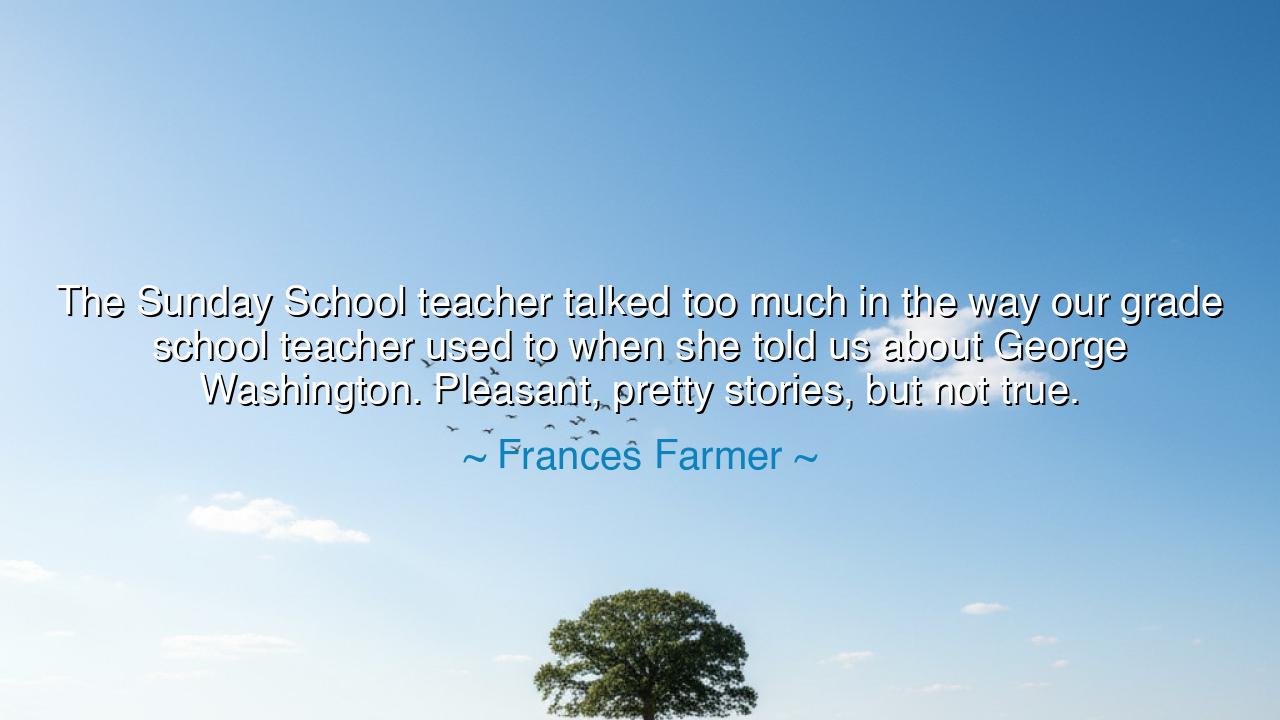
The Sunday School teacher talked too much in the way our grade
The Sunday School teacher talked too much in the way our grade school teacher used to when she told us about George Washington. Pleasant, pretty stories, but not true.






Hearken, O children of discernment and inquiry, to the words of Frances Farmer, whose reflection pierces the veil of comforting illusion: “The Sunday School teacher talked too much in the way our grade school teacher used to when she told us about George Washington. Pleasant, pretty stories, but not true.” In this utterance lies a meditation upon the tension between narrative charm and the pursuit of truth, a warning that the sweetness of story must never eclipse the reality that underpins it.
Farmer observes that those who instruct—whether in sacred halls or in the classrooms of youth—often cloak the complexities of history and human experience in layers of palatability. Tales are told to comfort, to inspire, or to edify, yet in their simplification they may distort, omitting the ruggedness and imperfection of life. Here lies an ancient truth: the pursuit of knowledge demands courage to face the unvarnished, the flawed, and the difficult, rather than settling for the soothing allure of fiction dressed as fact.
Consider the story of Herodotus, the ancient historian, who labored to record the events of the Greco-Persian Wars. Even in his day, scholars recognized the temptation to embellish, to favor the noble tale over the factual account. Yet Herodotus strove to balance narrative engagement with truthfulness, acknowledging the myths and rumors he encountered while seeking evidence and testimony. Farmer’s critique resonates with this ancient struggle: the teacher who prioritizes charm over truth risks teaching the lesson of illusion rather than wisdom.
The essence of this reflection lies in discernment. The learner must cultivate the ability to see beyond pleasantness, to question, to probe, and to seek evidence. Stories, while inspiring, must be measured against reality, for the human soul grows not from comfort alone but from the courage to engage with truth, however inconvenient or unsettling. Farmer reminds us that education is not merely entertainment; it is the nurturing of critical thought and the sharpening of perception.
Even in our own times, the danger persists. Media, history books, and even revered educators may present narratives that charm or reassure while bending facts. Consider the revision of historical events, sanitized to soothe national pride or moral discomfort. Those who accept these narratives unquestioningly risk cultivating a mind at ease with falsehoods, mistaking the beauty of story for the rigor of truth. Farmer’s experience is a caution: do not mistake pleasantness for accuracy.
This teaching also calls for intellectual courage. To confront reality requires vigilance and independence of thought. The student or listener must ask, probe, and compare, seeking multiple sources and perspectives. Even revered figures, such as Abraham Lincoln, who prized honesty and insight, depended upon the critical engagement of his own mind to sift through stories, claims, and narratives, discerning what was true from what was merely agreeable or conventional.
O children of learning, take this teaching to heart: cherish narrative, but honor truth above comfort. Let the sweetness of story guide you toward curiosity, not replace inquiry; let the charm of tales inspire your pursuit of knowledge, not shield you from reality. Question the lessons given, verify the accounts, and embrace the complexity of human experience. Only then does learning transcend entertainment and cultivate wisdom.
Thus, let the words of Frances Farmer echo through the corridors of thought: pleasant, pretty stories may delight, but the mind and soul thirst for truth. Seek it with patience, courage, and discernment. Honor the teachers who illuminate reality, even when it is uncomfortable, and cultivate the habit of critical reflection. In this way, one honors both story and substance, and allows the flame of understanding to burn brightly through the ages.
If you wish, I can also create a practical guide for discerning truth in teaching and storytelling, inspired by Farmer’s reflection, showing daily practices to cultivate critical thinking and avoid being swayed by mere charm. Do you want me to do that?






AAdministratorAdministrator
Welcome, honored guests. Please leave a comment, we will respond soon